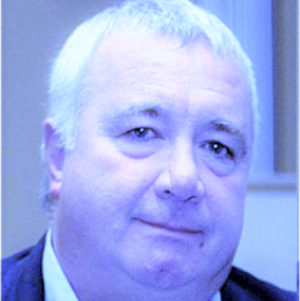
Professor Chris Haslett is a clinician-scientist, holding the Chair of Translational Medicine and leading a research group with the University of Edinburgh’s Centre for Inflammation Research studying the cell biology of lung inflammation and scarring (particularly granulocyte biology and apoptosis), molecular imaging, and conducting clinical translational research.
After a three-year MRC Travelling Fellowship in Peter Henson’s laboratory (Denver, CO) where he did novel research on neutrophil priming and trafficking and discovered neutrophil apoptosis, Chris returned in 1985 to the Royal Postgraduate Medical as MRC Senior Clinical Fellow. There he set up a small group to define the role of granulocyte apoptosis in the resolution and control of inflammation. The group was joined consecutively by John Savill and Moira Whyte as MRC Training Fellows and a number of key discoveries were made. In collaboration with the MRC Cyclotron Unit at the RPMS, Chris also carried out novel research on PET imaging to quantify lung inflammation and scarring.
In 1990, he moved to Edinburgh and was joined by Ian Dransfield and Edwin Chilvers, and subsequently by Tariq Sethi, Seamus Donnelly and Adriano Rossi. Funded by consecutive MRC programme grants, the focus was on harnessing the apoptotic and recognition processes to drive resolution of inflammation/scarring processes culminating in the discovery that cdk inhibitors could ‘drive’ neutrophil apoptosis and promote the resolution of inflammatory/scarring processes, thus ‘squaring the circle’ of 20 years of apoptosis research.
In Edinburgh, Chris also renewed his interest in neutrophil-generated lung injury and molecular imaging of lung inflammation/fibrosis. With Seamus Donnelly, key observations were made in the early risk period of the devastating disease ARDS. In the past decade, he joined forces with Kev Dhaliwal to create a new cadre of scientists to meet the challenges and opportunities of the molecular imaging ‘revolution’. Funded by major grants from the MRC, EPSRC and Wellcome Trust, this group has created novel optical imaging ‘SmartProbes’ which, partnered with in-vivo bronchoscopic confocal microscopy, are now being applied in ‘first-into-human’ studies of lung inflammation and fibrosis
Publications
Activated neutrophil fluorescent imaging technique for human lungs (2021).
Craven T H, Walton T, Akram A R, Scholefield E, Mcdonald N, Marshall A D L, Humphries D C, Mills B, Campbell T A, Bruce A, Mair J, Dear J W, Newby D E, Hill A T, Walsh T S, Haslett C, Dhaliwal K.
Molecular detection of Gram-positive bacteria in the human lung through an optical fiber–based endoscope (2020).
Mills B, Megia-Fernandez A, Norberg D, Duncan S, Marshall A, Akram AR, Quinn T, Young I, Bruce AM, Scholefield E, Williams GOS, Krstajić N, Choudhary TR, Parker HE, Tanner MG, Harrington K, Wood HAC, Birks TA, Knight JC, Haslett C, Dhaliwal K, Bradley M, Ucuncu M, Stone JM.
In situ identification of Gram-negative bacteria in human lungs using a topical fluorescent peptide targeting lipid A (2018).
Akram AR, Chankeshwara SV, Scholefield E, Aslam T, McDonald N, Megia-Fernandez A, Marshall A, Mills B, Avlonitis N, Craven TH, Smyth AM, Collie DS, Gray C, Hirani N, Hill AT, Govan JR, Walsh T, Haslett C, Bradley M, Dhaliwal K.
Bimodal fluorogenic sensing of matrix proteolytic signatures in lung cancer (2018).
Megia-fernandez A, Mills B, Michels C, Chankeshwara, S V, Krstajić N, Haslett C, Dhaliwal K, Bradley M.
Super-silent FRET sensor enables live cell imaging and flow cytometric stratification of intracellular serine protease activity in neutrophils (2018).
Craven TH, Avlonitis N, McDonald N, Walton T, Scholefield E, Akram AR, Walsh TS, Haslett C, Bradley M, Dhaliwal K.
Cerebral Concussion Primes the Lungs for Subsequent Neutrophil-Mediated Injury (2018)
Humphries DC, O’Neill S, Scholefield E, Dorward DA, Mackinnon AC, Rossi AG, Haslett C, Andrews PJD, Rhodes J, Dhaliwal K
Dorward DA, Lucas CD, Doherty MK, Chapman GB, Scholefield E, Morris AC, Felton JM, Kipari T, Humphries D, Robb CT, Simpson AJ, Whitfield PD, Haslett C, Dhaliwal K, Rossi AG.
Optical molecular imaging of lysyl oxidase activity–detection of active fibrogenesis in human lung tissue (2015).
Aslam T, Miele A, Chankeshwara SV, Megia-Fernandez A, Michels C, Akram AR, McDonald N, Hirani N, Haslett C, Bradley M.
A labelled-ubiquicidin antimicrobial peptide for immediate in situ optical detection of live bacteria in human alveolar lung tissue (2015).
Akram AR, Avlonitis N, Lilienkampf A, Perez-Lopez AM, McDonald N, Chankeshwara SV, Scholefield E, Haslett C, Bradley M, Dhaliwal K.
